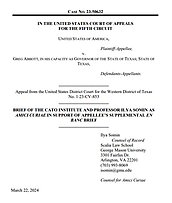In their amicus brief, the Cato Institute and Professor Ilya Somin take no position on the statutory issues, but urge the U.S. Court of Appeals for the Fifth Circuit to reject Texas’s dangerous Invasion Clause argument. It is at odds with the text and original meaning of the Invasion Clause and would have extraordinarily dangerous implications if accepted by federal courts.
Part I of the brief explains why Texas’s interpretation of the Invasion Clause is manifestly wrong under the text and original meaning of the Clause. As James Madison emphasized in his Report of 1800, “Invasion is an operation of war.” The term does not include illegal migration or drug smuggling.
Part II outlines the dire implications of Texas’ arguments. State governments would have the power to wage war in response to undocumented migration and smuggling, even if such warfare were not authorized by Congress. This would be a major undermining of Congress’ sole power to declare war and threatens to involve the United States in warfare at the behest of a single state government. The state’s position would also effectively give the federal government the power to suspend the writ of habeas corpus at any time, since the Constitution gives the federal government the authority to do so “when in Cases of Rebellion or Invasion the public Safety may require it.” Since some significant amounts of illegal migration and cross-border smuggling occur at virtually all times, this would give the federal government the power to suspend the writ whenever it wants to. When the writ of habeas corpus is suspended, the government can arrest and detain people without trial, and without filing charges. That power would apply to American citizens and permanent residents, not just migrants who have recently crossed the border.
Finally, Part III outlines how three circuit court decisions have ruled that “invasion” does not include illegal migration and is limited to military attack. If the Fifth Circuit rules the other way, it would create a circuit split, a result disfavored by Fifth Circuit precedent.


